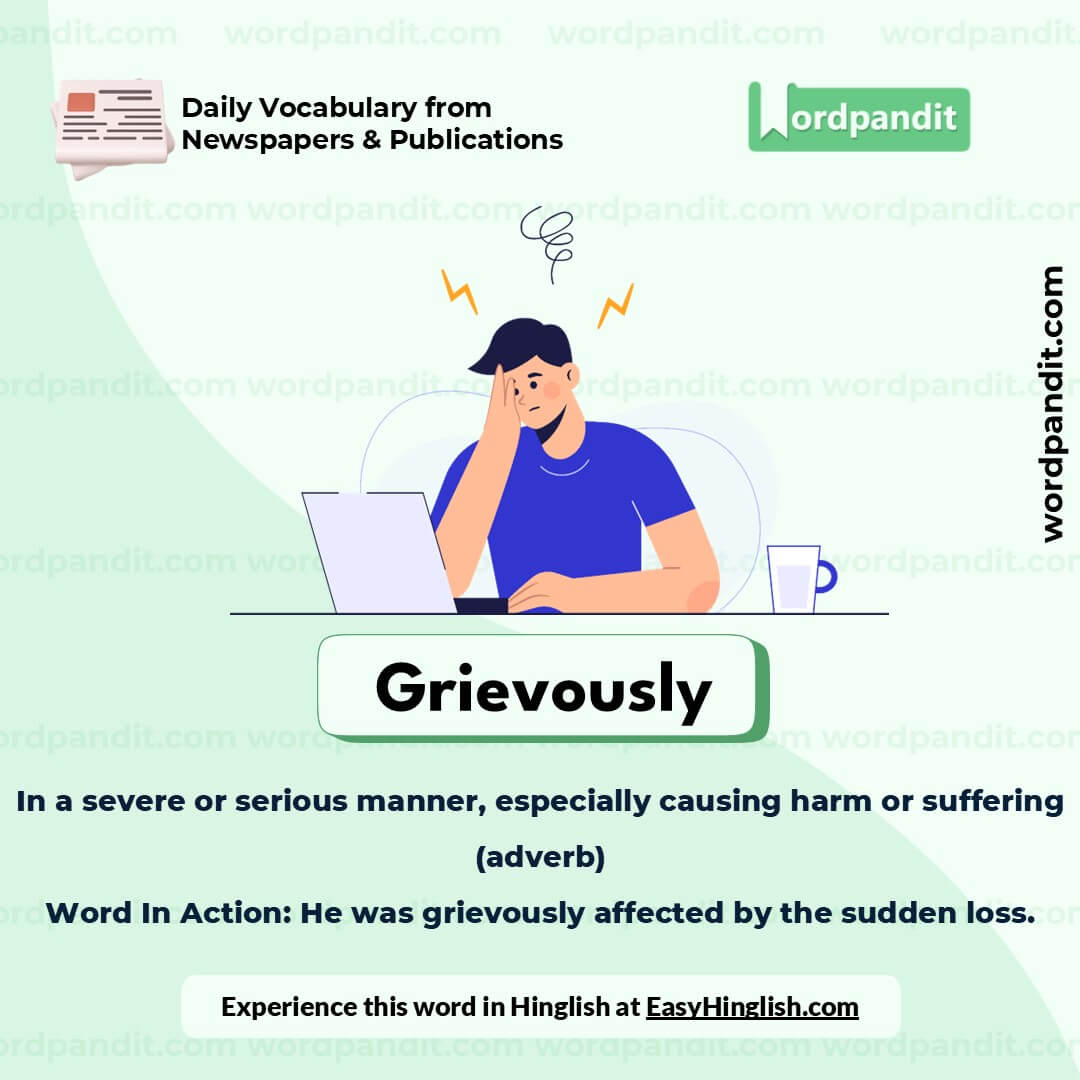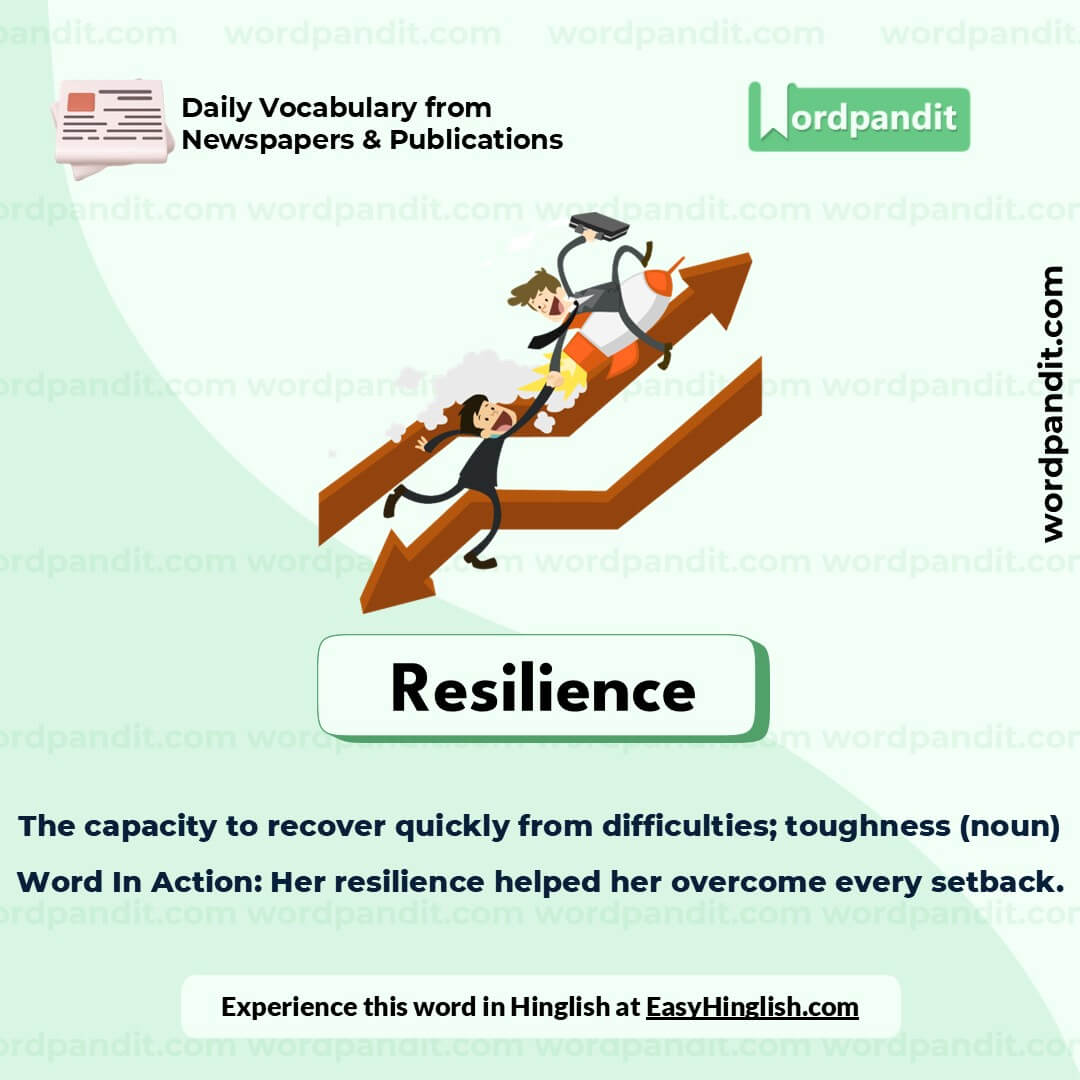Daily Vocabulary from Indian Newspapers and Publications
Welcome to Wordpandit’s Indian Vocabulary Hub
At Wordpandit, we understand the importance of staying rooted in the local context while expanding your language skills. This section focuses on enriching your vocabulary with words and phrases drawn from India’s leading newspapers and publications, ensuring you're learning vocabulary that is practical, relevant, and uniquely Indian.
Why Indian Sources Matter
We believe that the best way to master any language is by immersing yourself in local content. That’s why we carefully curate vocabulary from top Indian publications, including:
- The Hindu
- The Times of India
- The Economic Times
- Hindustan Times
- Live Mint
- The Indian Express
- And many others...
Stay Updated, Stay Relevant
With daily updates from Indian news sources, you’ll be consistently learning words that reflect the trends and shifts in Indian society and culture. Our focus is to provide vocabulary that enhances your understanding of the language in an Indian context.
How Wordpandit Supports Your Goals
Whether you’re preparing for exams, aiming to improve your professional communication, or simply want to stay connected with the latest Indian vocabulary, Wordpandit is here to guide you every step of the way.
Learn with a Practical Approach
Our interactive learning methodology includes real-world examples, engaging activities, and context-specific usage to ensure that every word becomes part of your active vocabulary.
Dive into Indian Vocabulary Today!
Why Choose Wordpandit?
Practical Learning: Focus on words you'll actually encounter in real-world reading, enhancing your comprehension and communication skills.
Diverse Content: From current affairs to scientific breakthroughs, our varied sources expose you to vocabulary across multiple domains.
Effortless Integration: Make Wordpandit a part of your daily routine. Just a few minutes each day can significantly boost your lexicon over time.
Your Path to Vocabulary Mastery
- Visit our Daily Vocabulary section regularly
- Explore new words and their usage in context
- Practice incorporating these words into your own writing and speech
- Track your progress as your vocabulary expands
Start Your Journey Today
Embark on your vocabulary enhancement journey with Wordpandit. By consistently engaging with our daily posts, you'll build a robust vocabulary that serves you well in academic, professional, and personal contexts.
Remember, a word a day keeps linguistic limitations at bay. Make Wordpandit your daily companion in the quest for vocabulary excellence!
WORD-1: Academic
Context:
"I live down the road from the M. Chinnaswamy Stadium, and in normal circumstances would never have missed watching the beginning of a Test match there. However, on October 16, I had some academic work to finish; besides, with New Zealand having performed so poorly on their recent tour of Sri Lanka, and the great Kane Williamson missing through injury, I thought I would give this first day a miss but show up later if the match turned out to be at all competitive." - The Telegraph
Explanatory Paragraph:
The word academic refers to anything related to education, learning, or scholarly pursuits. It is commonly used to describe activities, institutions, or work associated with the realm of study and knowledge. Here, the speaker mentions having “academic work,” implying tasks or responsibilities related to education or research that required attention over other interests.
Meaning: Pertaining to education, learning, or scholarly work (adjective)
Pronunciation: ak-uh-DEM-ik
Difficulty Level: ⭐⭐ (Basic-Intermediate)
Etymology: From the Latin academicus, rooted in Ancient Greek Akadēmeia, referring to the philosophical school of Plato.
Synonyms & Antonyms:
Synonyms: educational, scholarly, intellectual, theoretical
Antonyms: practical, nonacademic, applied
Usage Examples:
- Her academic interests include philosophy and modern history.
- He spent years working in an academic setting before joining the corporate sector.
- Many students find balancing academic and extracurricular activities challenging.
- Academic research often requires a thorough analysis of sources.
Cultural Reference:
"Education is the most powerful weapon which you can use to change the world." - Nelson Mandela
Think About It:
How does academic learning differ from other types of learning, such as hands-on experience or self-study?
Quick Activity:
Write down three subjects or areas you are academically interested in, and list one question you would love to explore in each area.
Memory Tip:
Remember "academic" by associating it with "academy," a place of learning, helping link the word to scholarly pursuits.
Real-World Application:
The term "academic" is widely used to describe school-related activities, career paths, and even discussions focused on theory rather than practical application. It's often heard in contexts like "academic goals," "academic research," and "academic performance."
WORD-2: Bundled
Context:
"Hence I missed the spectacle of the powerful Indian batting side being bundled out for 46. It appears that like Gautam Gambhir, Rohit Sharma and company, I had grievously underestimated the resilience of these Kiwi cricketers." - The Telegraph
Explanatory Paragraph:
The word bundled here refers to being gathered or brought together quickly and forcefully, often in a way that suggests being taken down or dismissed in an unexpected manner. In cricket, “bundled out” typically means the batting team was dismissed for a low score, perhaps in a swift or decisive way, indicating a strong performance from the opposition’s bowlers.
Meaning: To gather, group, or deal with quickly and efficiently, often in a forceful way (verb)
Pronunciation: BUHN-duld
Difficulty Level: ⭐⭐ (Basic-Intermediate)
Etymology: From Middle Dutch bondel, meaning “a package or bundle”; later adapted to mean treating things collectively or together.
Synonyms & Antonyms:
Synonyms: gathered, amassed, herded, dispatched, grouped
Antonyms: separated, dispersed, divided, scattered
Usage Examples:
- The hikers bundled together for warmth as the temperature dropped.
- All the applications were bundled and sent to the hiring committee at once.
- The crowd bundled up their belongings as the rain began to pour.
- Despite their skill, the team was bundled out of the tournament early.
Cultural Reference:
"When they bundled out for a low score, fans saw it as a shocking defeat." - Common sports commentary describing unexpected upsets in cricket and other team sports.
Think About It:
What situations might lead a strong team to be “bundled out” unexpectedly? How does this concept apply outside of sports?
Quick Activity:
Think of three times when you or a group were “bundled” through an activity or task quickly. Write down why it happened and how it made you feel.
Memory Tip:
Picture “bundling” as grabbing multiple things at once—just like wrapping up a group of items together—helping remember the sense of quick grouping or gathering.
Real-World Application:
The term "bundled" is widely used beyond sports; for example, tech companies often “bundle” software products together in packages, and stores offer “bundled” deals. It conveys a sense of grouping items together for efficiency or effect.
WORD-3: Grievously
Context:
"Hence I missed the spectacle of the powerful Indian batting side being bundled out for 46. It appears that like Gautam Gambhir, Rohit Sharma and company, I had grievously underestimated the resilience of these Kiwi cricketers." - The Telegraph
Explanatory Paragraph:
The word grievously is used to emphasize the seriousness or severity of an error, harm, or misjudgment. In this context, the speaker expresses that they had severely underestimated the ability of the New Zealand cricket team, indicating that their mistake was more significant than they had initially thought.
Meaning: In a severe or serious manner, especially causing harm or suffering (adverb)
Pronunciation: GREE-vuhs-lee
Difficulty Level: ⭐⭐⭐ (Intermediate)
Etymology: From the Old French grevouse and Latin gravis, meaning "heavy" or "serious."
Synonyms & Antonyms:
Synonyms: severely, seriously, painfully, intensely, direly
Antonyms: mildly, slightly, trivially, insignificantly
Usage Examples:
- The soldier was grievously injured during the battle and needed immediate medical attention.
- She grievously miscalculated the risks, resulting in a major setback for the project.
- The community was grievously affected by the natural disaster, requiring extensive recovery efforts.
- He regretted his actions grievously, knowing they had caused unintended harm.
Cultural Reference:
"To err is human, but to persist in error is grievous." - Popular saying that emphasizes the importance of correcting one’s mistakes before they lead to severe consequences.
Think About It:
What kinds of mistakes or decisions might people come to grievously regret? How can we avoid such serious errors in judgment?
Quick Activity:
Write about a time you made a mistake you later grievously regretted. What did you learn from the experience?
Memory Tip:
Think of "grievously" as "grieving over" a mistake or action to help remember it signifies severity or seriousness.
Real-World Application:
“Grievously” is often used to describe severe injuries, deep mistakes, or serious misjudgments. It emphasizes the extent of harm or regret, making it a powerful word in formal contexts like reports, articles, or personal reflections.
WORD-4: Resilience
Context:
"Hence I missed the spectacle of the powerful Indian batting side being bundled out for 46. It appears that like Gautam Gambhir, Rohit Sharma and company, I had grievously underestimated the resilience of these Kiwi cricketers." - The Telegraph
Explanatory Paragraph:
Resilience is the ability to bounce back or recover quickly from difficulties, challenges, or failures. It is often associated with mental and emotional strength. In this context, “resilience” refers to the New Zealand cricket team’s ability to withstand setbacks and perform well despite the odds, proving they were stronger than initially anticipated.
Meaning: The capacity to recover quickly from difficulties; toughness (noun)
Pronunciation: ri-ZIL-yuhns
Difficulty Level: ⭐⭐⭐ (Intermediate)
Etymology: From Latin resilire, meaning "to rebound" or "to spring back."
Synonyms & Antonyms:
Synonyms: toughness, endurance, flexibility, perseverance, grit
Antonyms: weakness, fragility, vulnerability, rigidity
Usage Examples:
- The community showed remarkable resilience in rebuilding after the flood.
- Her resilience helped her overcome the challenges of starting a new business.
- The resilience of the human spirit often shines brightest in times of hardship.
- He admired the resilience of athletes who train through setbacks and injuries.
Cultural Reference:
"Resilience is knowing that you are the only one that has the power and the responsibility to pick yourself up." - Mary Holloway
Think About It:
What are some challenges that can build resilience in a person, and how can one develop greater resilience?
Quick Activity:
Think of a recent challenge you faced. Write down the ways in which you demonstrated resilience and what you learned from the experience.
Memory Tip:
Remember "resilience" by associating it with "resilient rubber," which bounces back when compressed, just as resilient people bounce back from adversity.
Real-World Application:
Resilience is an important trait in various fields, from sports and business to mental health, where it enables individuals to face setbacks and continue moving forward with strength and determination.
WORD-5: Remorse
Context:
"That evening, as I rued my foolish non-appearance at the ground, I chose out of remorse to honour the visitors by choosing an all-time eleven of their country’s greatest players." - The Telegraph
Explanatory Paragraph:
Remorse refers to a deep sense of regret or sorrow for one’s actions, often accompanied by a desire to make amends. In this sentence, the speaker expresses remorse for missing an important event, feeling regretful enough to take an action that honors the visiting team as a way of acknowledging their mistake.
Meaning: Deep regret or guilt for a wrong committed (noun)
Pronunciation: ri-MAWRS
Difficulty Level: ⭐⭐⭐ (Intermediate)
Etymology: From Latin remordere, meaning "to bite again," symbolizing the "biting" feeling of guilt.
Synonyms & Antonyms:
Synonyms: regret, guilt, sorrow, contrition, penitence
Antonyms: indifference, apathy, satisfaction, pride
Usage Examples:
- He felt deep remorse for the harsh words he had spoken in anger.
- Out of remorse, she apologized and sought to make up for her mistakes.
- The criminal expressed genuine remorse during the trial, asking for forgiveness.
- Even years later, she felt remorse over how she had treated her friend.
Cultural Reference:
"True remorse is never just a regret over consequence; it is a regret over motive." - Mignon McLaughlin
Think About It:
What actions can we take to move past feelings of remorse, and how can remorse inspire positive change?
Quick Activity:
Think of a time you felt remorseful about something you did or said. Write down what you learned from the experience and how it impacted your future actions.
Memory Tip:
Link "remorse" with "re-morse," as in feeling the "bite" of guilt repeatedly, helping you remember the sense of lingering regret.
Real-World Application:
Remorse plays a crucial role in personal growth, as it often leads people to apologize, seek forgiveness, and make amends. It encourages reflection and can guide us toward making more ethical choices in the future.


















